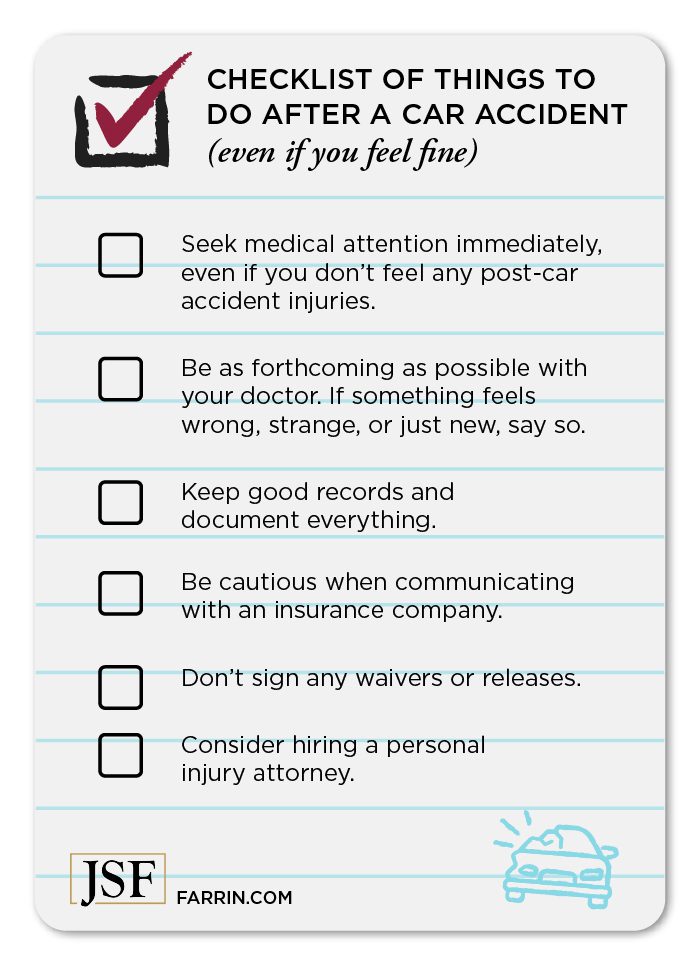The idea of late-appearing car accident injuries sounds strange. If you’re injured, you’ll feel it, right? That’s not always the case. While you are almost certainly going to notice an injury when you’re bleeding profusely or have a badly broken bone, some injuries may be masked in the heat of the moment, and your after-car accident symptoms can take hours, days, or longer to appear. Here’s what you should know.
What Causes Delayed Injuries After a Car Accident?
Ever wonder why people often claim they’re sore the day after a car accident? The short answer is adrenaline. Adrenaline (also called epinephrine) is a hormone triggered by the body’s fight-or-flight reflex. When something traumatic like a car crash happens, the body pumps out adrenaline to help you survive a dangerous situation.
Adrenaline enables the body to:
-
- Dilate air passages to increase oxygen flow to muscles
-
- Contract blood vessels to redirect blood flow to the heart and lungs
-
- Decrease the body’s ability to feel pain
-
- Increase strength, performance, and threat awareness
With veins full of adrenaline – call it a mute button for pain – you may not feel hurt. Adrenaline can delay common car accident injury symptoms. And, if there are no physically apparent signs of injury, you may even decline medical attention. That can be a big mistake. There are several kinds of injuries that you may not feel for a while.
Common Late-Appearing Car Accident Injuries
The body is a strange and wonderful thing, but sometimes you just can’t trust it. With adrenaline in play, you may not know you’re injured, leading to the phenomenon of late-appearing car accident injuries. Some soft tissue injuries, especially to the organs, aren’t always immediately apparent in any case. As a result, your health could be at risk and you aren’t even aware of it.
People often want to know what to expect physically after a car accident. What are some after-car accident symptoms to look for? Other than feeling sore after a car accident, what should you watch for? Here are some injuries you should be aware of, but may not feel!
 Brain Injuries
Brain Injuries
Here’s an example. A healthy woman falls during a ski lesson but rises and continues about her day, joking with friends and seemingly none the worse for wear. She’s completely lucid. Later in the day, she complains of head pain. A few days later, she dies from an epidural hemorrhage.
There may be no difference in the forces the skier experienced in her fall and the forces you experience in a car crash – in fact, a car crash victim may be more at risk because they probably weren’t wearing a helmet. People on certain medications, such as blood thinners, are especially at risk for epidural hemorrhages, but you don’t need any preexisting conditions for it to happen.
This kind of traumatic brain injury is a risk in any crash. According to a congressional report by the National Institute of Neurological Disorders and Stroke, half of all traumatic brain injury victims received their injuries in automobile accidents.
Concussions are another brain injury that may take time to manifest. It happens when a bump, jolt, or blow to the head moves it violently one way and then the other, causing the brain to “bounce” within the skull. It doesn’t matter that your skull didn’t crack. What matters is what happened inside.
Plus, contrary to popular belief, you do not have to “black out” or lose consciousness due to a concussion. In fact, according to the Centers for Disease Control (CDC), most concussions do not result in a loss of consciousness. Signs of a concussion can include headaches, dizziness, or even changes in behavior.
 Abdominal Injuries
Abdominal Injuries
So-called “blunt trauma” to the abdomen – when something applies sudden, direct force to the body – can happen in car accidents. In a study of patients admitted to a trauma center over two years, from 2010 to 2012, researchers found that it took more than eight hours for intra-abdominal injuries to become clinically apparent after blunt trauma.
According to the study, “patients with a blunt intra-abdominal injury manifested a clinical sign or symptom of their intra-abdominal injury, resulting in their diagnosis within eight hours 25 minutes of arrival to the hospital.” Even in a hospital setting, it took more than eight hours on average to diagnose the issue.
Another example of an abdominal injury that may exhibit delayed onset is a bowel perforation – a tear in the intestines or the bowels due to the blunt trauma from the accident. In one case, it took weeks for physicians to diagnose the patient. Many different abdominal injuries may show no immediate symptoms.
The forces at work in a car crash may even weaponize the safety equipment. Seat belts, for example, protect you in the event of a serious accident, and they prevent you from being ejected from the vehicle. However, the restraints can put sudden and sometimes powerful pressure on your body, resulting in what’s called seat belt syndrome.
Seat belt syndrome takes the form of bruising and tenderness of the abdomen and, sometimes, an injury to an organ or even vertebral fractures. In one case, two different car accident patients were admitted to a hospital with symptoms of seat belt syndrome. While scans were initially negative, both were eventually diagnosed with peritonitis – an inflammation of the abdominal lining. One patient’s diagnosis came within 24 hours. The other took three days.
These injuries can and do happen, and you should seek medical attention and give your body time to reveal any injuries you may have suffered.
 Injuries to Muscles, Ligaments, and Joints
Injuries to Muscles, Ligaments, and Joints
Muscles and connecting tissue undergo a lot of stress in car accidents. Bruising is common – maybe you hit your arm or knee on the dashboard or door. The trouble is that you might not feel those bruises or more severe injuries right away. You could have a sprain or a strain and not even know it. What’s the difference?
-
- Sprain: A sprain is a stretch and/or tear of a ligament (the tissue connecting two bones). Ligaments are the stabilizers for the joints. Sprains may not be immediately apparent and can later affect mobility, range of motion, and many other daily activities. Without the ligaments in the knee to connect the upper leg with the lower leg, you couldn’t walk or run, as an example.
-
- Strain: A strain is a twist, pull, and/or tear of muscles or tendons. Tendons are what connect muscles to bones. Muscle strains are graded by severity. A grade one strain doesn’t inhibit you but will be sore. A grade two strain means nearly half of the muscle fibers are torn and results in pain, swelling, and loss of strength. A grade three strain occurs when either the tendon has separated from the muscle or the muscle itself is entirely ruptured, resulting in severe pain and complete loss of function. You may not even realize these injuries at first, especially grade one and grade two strains.
Many of these types of injuries come from hyperextension – the flexing of the body beyond its limits. Other injuries we see people suffering from delayed onset include:
-
- Plantar fasciitis: This is an injury to the band of tissue connecting the heel bone to the toes, causing stabbing pain and limiting mobility. When bracing for an impact, you might brace your heel on the floorboard, causing this kind of injury. Temporomandibular joint dysfunction (TMJ): This is an injury to the ligaments in the jaw causing pain, limiting movement of the jaw, and in some cases locking the jaw. TMJ can happen in airbag deployment, for example.Carpal tunnel syndrome: Most people think of this as a repetitive stress disorder, but in truth, any force that constricts or irritates the median nerve in the carpal tunnel can cause it. Causes include wrist fractures and hyperextending the wrist in a car accident.
 Whiplash and Back Injuries in Car Accidents
Whiplash and Back Injuries in Car Accidents
One of the most common and sometimes most debilitating injuries someone can suffer in a car accident is whiplash. We’ve dedicated an entire page to discussing whiplash in detail, including the tendency of the injury to manifest long after the accident that caused it.
Back injuries are also common, and some can also exhibit delayed after-accident symptoms. An injury like a herniated disc may not present itself until you bend, lift, or even just lay down. Even spinal cord injuries may not be immediately evident but can have a dramatic, long-lasting, and even permanent effect on your life and ability to function. Delayed back pain after a car accident is not uncommon, so pay attention to your body.
Delayed Injury After a Car Accident: Your Mental Health
Car accidents are traumatic events, not just for the body but the mind as well. They can put a great deal of stress on your mental well-being – worries about the future, stress about your health, and even witnessing the effect of the accident on others can stay with you.
Believe it or not, car accidents are the leading cause of post-traumatic stress disorder (PTSD) in the general population. According to a National Institute of Mental Health (NIMH) study, 39.2% of survivors of motor vehicle accidents (MVAs) develop PTSD. It’s not hard to believe that victims aren’t immediately diagnosed, considering that the standard for diagnosis requires someone to suffer symptoms for at least one month.
Why You Should Seek Medical Attention: Beyond Health
Delayed onset injuries threaten your health after a car accident. However, there’s something else at risk as well: your financial well-being. Not seeking immediate medical attention or not bringing discomfort or pain to the attention of a physician as soon as possible can jeopardize your ability to seek compensation.
Late-Appearing Car Accident Injury Insurance Claims May Be Easier to Deny
The insurance companies involved in a car accident case look for suspicious behavior as they try to filter out fraudulent claims. The unfortunate side effect is that they may deny claims filed days or weeks later for injuries with delayed onset. Thus, if you don’t seek medical attention and aren’t reporting pain, discomfort, or anything that feels wrong or out of the ordinary as soon as possible, the insurance company may argue that you weren’t injured at all and deny your claim.
My advice is to seek treatment immediately. Medical professionals may be able to notice things you aren’t able to feel just yet. Initial medical attention immediately after an accident starts a record of your health after the accident. Insurance companies want to see a pattern of seeking care. They want to see a physician’s diagnosis and treatment recommendations. That’s logical to them. Delayed onset injuries don’t work that way, so this can become a point of contention.
Beware of Signing a Document That Waives the Liability of the Insurance Company
After the accident, the insurance company will be in touch. Be careful what you say to them because, as we’ve established, you may not feel any pain and still have a perfectly legitimate injury. The questions they ask are usually scripted and worded very specifically. You may think you’re being friendly while harming your case for potential compensation.
If you say you’re feeling fine, the insurance company may ask you to sign a document that releases the insurance company from liability. You’re not injured, so no big deal, right? The document can be called any number of things, including (but not limited to):
-
- Release
-
- Release from Liability
-
- General Release
-
- Release From All Claims
-
- Liability Waiver
-
- Waiver of Liability
Regardless of what they call it, they’re asking you to settle your case, no matter what injuries manifest later. It can be incredibly difficult to seek compensation for an injury that hasn’t become apparent if you sign this form.
Speak to an Attorney Before You Sign Anything
You may file this under “obvious” coming from me, but I’ve seen too many people accept too little compensation for their injuries. These people can get stuck with expensive medical bills and other complications that significantly diminish their quality of life. Others sign away their rights for nothing and must make do without any financial help.
What to Do After You’re in an Accident – “I Got Hit By a Car But I Feel Fine”
Even if you feel fine after being in a car wreck, you should always seek medical care and keep track of your communications with the doctors and the insurance company. What if you ignore a small ache or pain that later turns into a significant injury? Have you hurt your chance for reimbursement? It’s possible. I suggest you follow this list of things to do after you’re in an accident:
The bottom line is, if you’re in a car accident, seek medical attention even if you “feel fine.” Delayed injury after a car accident is a very real possibility. Carefully monitor your body and mind after the accident, and continue to do so. Bring any concerns, pains, discomfort, or even weirdness to the attention of a physician.
Speak to the insurance company as carefully and as little as possible, or better yet, contact an attorney to try to avoid making a costly mistake. You may suffer from delayed injuries after your car accident, be injured and not even know it yet. And, even with a diagnosis, do you have any idea what the immediate and long-term care costs might be? And what about other expenses and costs that may be associated, like missed time at work?
This is what I work on all day, every day, on behalf of my clients. I do everything I can to try to ensure they’re treated fairly, and my team has extensive experience dealing with these injuries. We have a good idea what care could cost you – and it’s probably more than you think!
Don’t delay. We don’t charge upfront for our services — instead, we collect a portion of any compensation we recover for you. If you don’t collect, you don’t pay an attorney’s fee.2 Contact us and let’s see what we can do for you.
You May Also Be Interested In
From Injured in a Car Accident to Sitting in Court: When a Case Goes to Trial
What if I Was Injured in an Accident in North Carolina, but I Wasn’t Wearing my Seatbelt?




 Brain Injuries
Brain Injuries Abdominal Injuries
Abdominal Injuries Injuries to Muscles, Ligaments, and Joints
Injuries to Muscles, Ligaments, and Joints Whiplash and Back Injuries in Car Accidents
Whiplash and Back Injuries in Car Accidents

